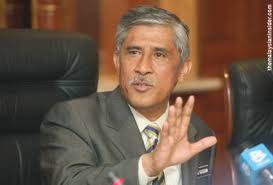December 31, 2010
Friends and Fellow Malaysians, I wish to end this year (2010) with Jagdish Bhagwati’s article on “Getting Corruption Right”. It is my New Year fervent hope that our Government deals firmly with the corrupt in our country. In 2011, we will see two senior politicians, Tun Ling Leong Sik, and Khir Toyo in our courts. More can be expected given the fact that the new year is likely to be an Election Year (both National and Sarawak state elections).
Political temperatures will rise, but I am confident that as a nation of mature and intelligent Malaysians, we will be able to stay sensible, rational, and responsible as we debate issues and discuss the future of our wonderful country, warts and all. –Din Merican
Getting Corruption Right
by Jagdish Bhagwati (December 29, 2010)
 NEW YORK – I just returned from India, where I was lecturing to the Indian Parliament in the same hall where US President Barack Obama had recently spoken. The country was racked by scandal. A gigantic, ministerial-level scam in the mobile-telephone sector had siphoned off many billions of dollars to a corrupt politician.
NEW YORK – I just returned from India, where I was lecturing to the Indian Parliament in the same hall where US President Barack Obama had recently spoken. The country was racked by scandal. A gigantic, ministerial-level scam in the mobile-telephone sector had siphoned off many billions of dollars to a corrupt politician.
But several of the MPs had also been taken aback on discovering that when Obama spoke to them, he read from an “invisible” teleprompter. This had misled his audience into thinking that he was speaking extemporaneously, a skill that is highly regarded in India.
Both episodes were seen as a form of corruption: one involved money, the other deception.  The two transgressions are obviously not equal in moral turpitude. But the Obama episode illustrates an important cross-cultural difference in assessing how corrupt a society is.
The two transgressions are obviously not equal in moral turpitude. But the Obama episode illustrates an important cross-cultural difference in assessing how corrupt a society is.
Transparency International and occasionally the World Bank like to rank countries by their degree of corruption, with the media then ceaselessly citing where each country stands. But cultural differences between countries undermine the legitimacy of such rankings – which are, after all, based on surveys of the public. What Obama was doing was a common enough practice in the United States (though one might expect better from an orator of his ability); it was not so in India, where such a technique is, indeed, regarded as reprehensible.
India certainly has corruption, like almost every other country. But India also has a culture in which people commonly assume that everyone in public life is corrupt unless they prove otherwise. Even a blind man will tell Transparency International: “I saw him take a bribe with my own eyes.” Indeed, a distinguished Indian bureaucrat, a man of unimpeachable character, once told me that his mother had told him: “I believe you are not corrupt only because you are my son!”
So, if you ask Indians whether their governance is marked by widespread corruption, they will answer with gusto: yes! But their exuberance biases India’s global ranking relative to more empirically minded countries.
A similar bias arises from the occasional tendency to view political patronage elsewhere as being more corrupt than the same practices at home. For example, when the East Asian financial crisis broke out, there followed a systematic attempt to pin the blame on the affected countries: “crony capitalism” allegedly had somehow crippled their economies! In other words, the acquaintances and benefactors of the East Asian leaders were “cronies,” whereas those of US leaders were “friends”?
In fact, it was clear that the culprits were the International Monetary Fund and the US Treasury, which had encouraged a shift to capital-account convertibility without understanding that the case for free capital flows was not symmetrical with the case for free trade.
But where substantial corruption can unambiguously be found, as it often can, one must recognize that it is not a cultural given. On the contrary, often it is the result of policies that have fed it.
India in the 1950’s had a civil service, and a political class, that were the envy of the world. If that seems shocking today, the loss of virtue must be traced to the all-pervasive “permit raj,” with its licensing requirements to import, produce, and invest, which grew to gargantuan proportions. High-level bureaucrats quickly discovered that licenses could be bartered for favors, while politicians saw in the system the means to help important financial backers.
Once the system had taken root, corruption percolated downward, from senior bureaucrats and politicians, who could be bribed do what they were not supposed to do, to lower-level bureaucrats, who would not do what there were supposed to do unless bribed. Clerks would not bring out files, or get you your birth certificate or land title, unless you greased their palms.
But if policies can create corruption, it is equally true that the cost of corruption will vary with the specific policies. The cost of corruption has been particularly high in India and Indonesia, where policies created monopolies that earned scarcity rents, which were then allocated to officials’ family members.
Such “rent-creating” corruption is quite expensive and corrosive of growth. By contrast, in China, the corruption has largely been of the “profit-sharing” variety, whereby family members are given a stake in the enterprise so that their earnings increase as profits increase – a type of corruption that promotes growth.
In the long run, of course, both types of corruption are corrosive of the respect and trust that good governance requires, which can undermine economic performance in its own right. But that does not absolve us of the responsibility to define corruption properly – and to acknowledge obvious and important cultural differences in how it is understood.
Jagdish Bhagwati, Professor of Economics and Law at Columbia University and Senior Fellow in International Economics at the Council on Foreign Relations, is the author of Termites in the Trading System: How Preferential Trade Agreements Undermine Free Trade.
Copyright: Project Syndicate, 2010.
http://www.project-syndicate.org



 The Singapore daily reported that in the past year Syed Mokhtar had emerged as “the single biggest beneficiary of state contracts and concessions worth billions of ringgit, making him Malaysia’s most favoured corporate son and the government’s partner of choice.”
The Singapore daily reported that in the past year Syed Mokhtar had emerged as “the single biggest beneficiary of state contracts and concessions worth billions of ringgit, making him Malaysia’s most favoured corporate son and the government’s partner of choice.”




